What Is the Hardest College to Get Into in 2025?
What's the hardest college to get into? Get insider info on admissions strategies and what selective universities look for in applicants.
It's late March. You are hunched over your laptop, fingers hovering over the keypad. A flash of movement from the corner of your screen. It's time. The 59 minutes have morphed into the 00 minutes of the next hour. This is it.
You click "open admissions decision."
This is a scene that has faced countless students across the country as they prepare for the next chapter in their lives. Unfortunately, in order to secure a top-notch education, many students must compete against hundreds of thousands of peers across the country. In this article, we will explore the hardest colleges to get into and what each of these colleges is looking for in an applicant. Our statistics and application insights are taken directly from each college's website, so by following our tips, you can ensure you're appealing directly to each university.
Many of the hardest colleges to get into are also the most costly ones. Sign up for a free profile on Bold.org to unlock thousands of scholarships to fund your higher education!
Get Matched to Thousands of Scholarships
Create your Bold.org profile to access thousands of exclusive scholarships, available only on Bold.org.
Create Free Profile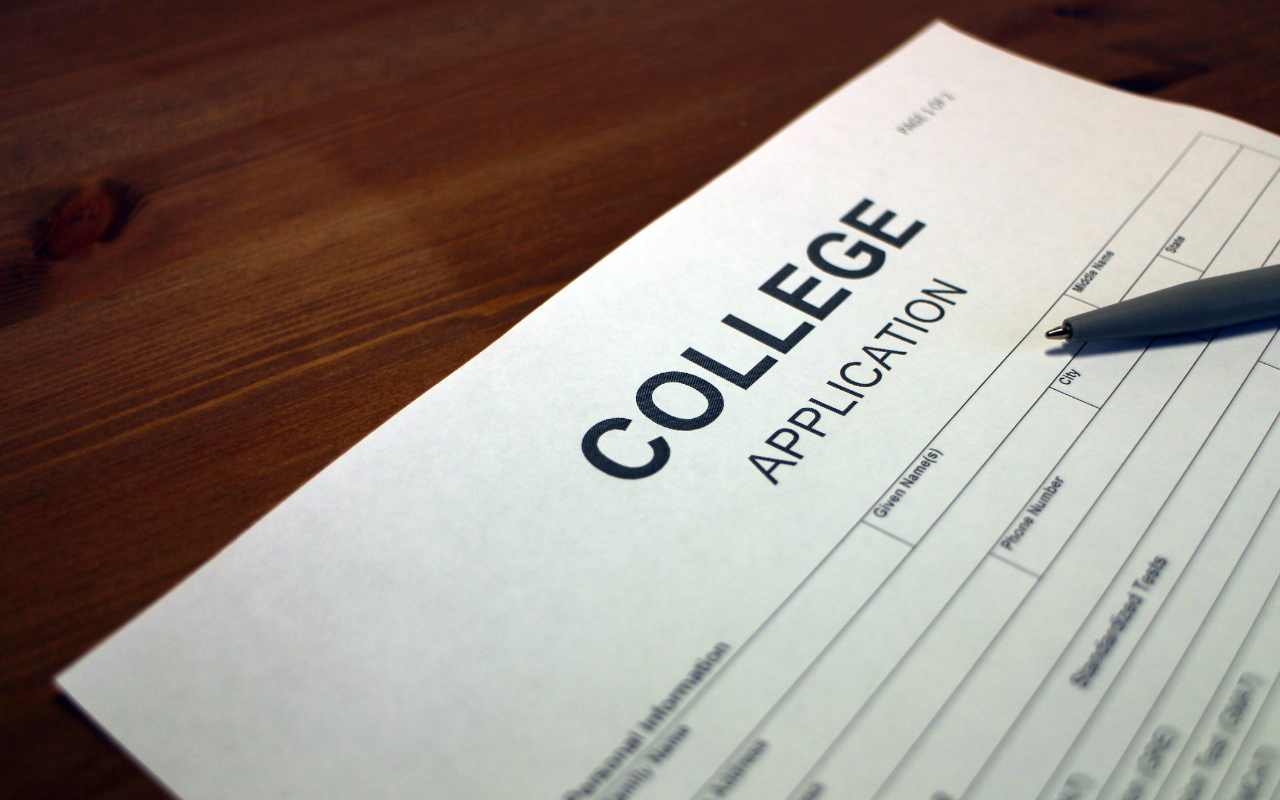
Acceptance Rates
Before deciding "what is the hardest college to get into", we must consider acceptance rates, which are calculated by dividing the number of accepted applicants by total applicants. We're focusing on undergraduate acceptance rates, which are separate from the graduate acceptance rate.
In addition, acceptance rates don't reflect individual applications but represent the average probability of acceptance. A 5% rate, for example, doesn't mean your chances are exactly 5%, as many factors in your application affect your odds.
It's also important to note that undergrad and graduate acceptance rates can be different. Many graduate degree programs are much more competitive than undergrad programs. If you're thinking of attending graduate school, make sure to research how much more competitive the acceptance rate will be—and also consider applying to these graduate school scholarships!
Early Decision & Early Action
Acceptance rates can be split into early decision (ED)/early action (EA) and regular decision (RD) rates. ED/EA rates are usually higher since fewer students apply, and ED applicants commit to attending if accepted. Applicants in the ED/EA cycle tend to submit stronger applications, as they’ve researched and prioritized their top-choice schools, leading to higher-quality submissions that align with the university's criteria.
Still have questions about early decision or early action? Check out our blog on early action to find out more!
Regular Decision
Most applicants submit during the regular decision (RD) cycle, making RD acceptance rates lower due to the higher volume. If you're set on one school, it's advised to apply early decision (ED) or early action (EA), but if you're undecided, regular decision is best. Acceptance rates are an overall average of both ED/EA and RD cycles, meaning your chances can vary depending on when you apply.
Without further ado, let's explore the hardest colleges to get into!
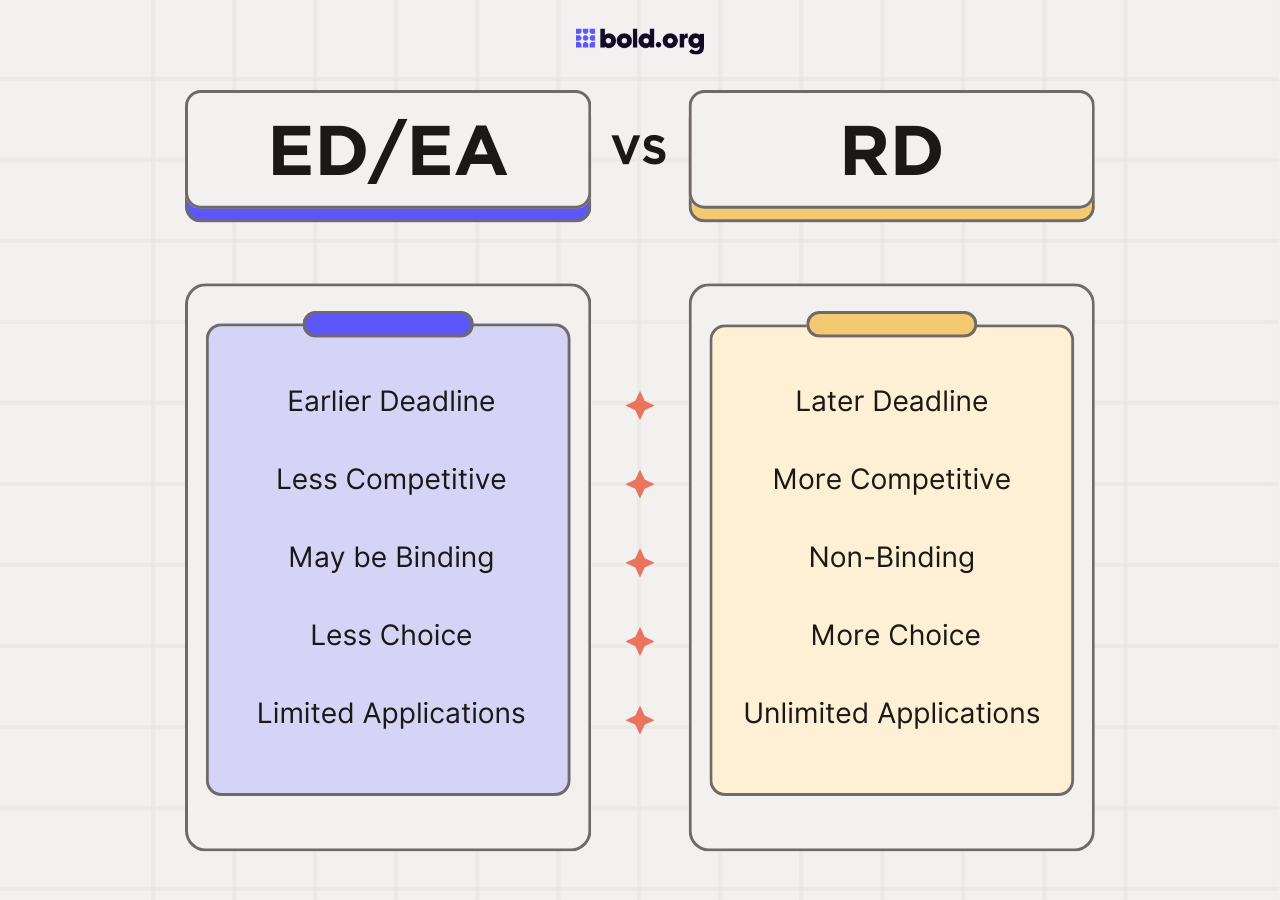
1. California Institute of Technology
The California Institute of Technology, also known as Caltech, is one of the country's foremost scientific innovators. Nestled in Pasadena, California, this private research university fosters a rigorous academic environment that allows students to contribute ground-breaking research toward STEM fields. Due to its small class sizes and reputation as a premier institution for science and technology, Caltech has the lowest acceptance rate in the country.
- Class of 2028: n/a (numbers not yet released)
- Class of 2027: 3.14%
- Class of 2026: 2.69%
"We're increasing our focus on evaluating your academic preparedness," the admissions team at Caltech states on their admissions website. "Caltech is looking for students with incredible potential in STEM." Without a doubt, an extremely strong academic record is the most important factor in gaining admission to Caltech. Additionally, specific STEM classes are required prior to arriving at Caltech.
- Average ACT Score: 34-36
- Average SAT Score: 1530-1580
- Average GPA: 3.9-4.0 (unweighted)

2. Harvard University
Harvard University is arguably the most prestigious university in the US. Founded in 1636, this Ivy League college has produced countless Nobel Prize laureates, Pulitzer Prize winners, and exceedingly distinguished alumni in every field imaginable. Due to its world-class education and hallowed reputation, it is one of the hardest colleges to get into, and it has very low acceptance rates.
- Class of 2028: 3.59%
- Class of 2027: 3.41%
- Class of 2026: 3.19%
"There is no formula for gaining admission to Harvard," says its admissions team on their website. They stress a strong academic record but also want to see leadership, community involvement, and distinction in extra-curricular activities. Accepted students are able to demonstrate their strength of character, ability to overcome adversity, and other positive traits that would benefit Harvard's campus.
- Average ACT Score: 33-35
- Average SAT Score: 1460-1580
- Average GPA: 3.9-4.0 (unweighted)
As a prestigious Ivy League school, Harvard offers immense opportunities for those who get in. For more information about how to capitalize on your college experience, browse through our scholarship blog, written by and for students.
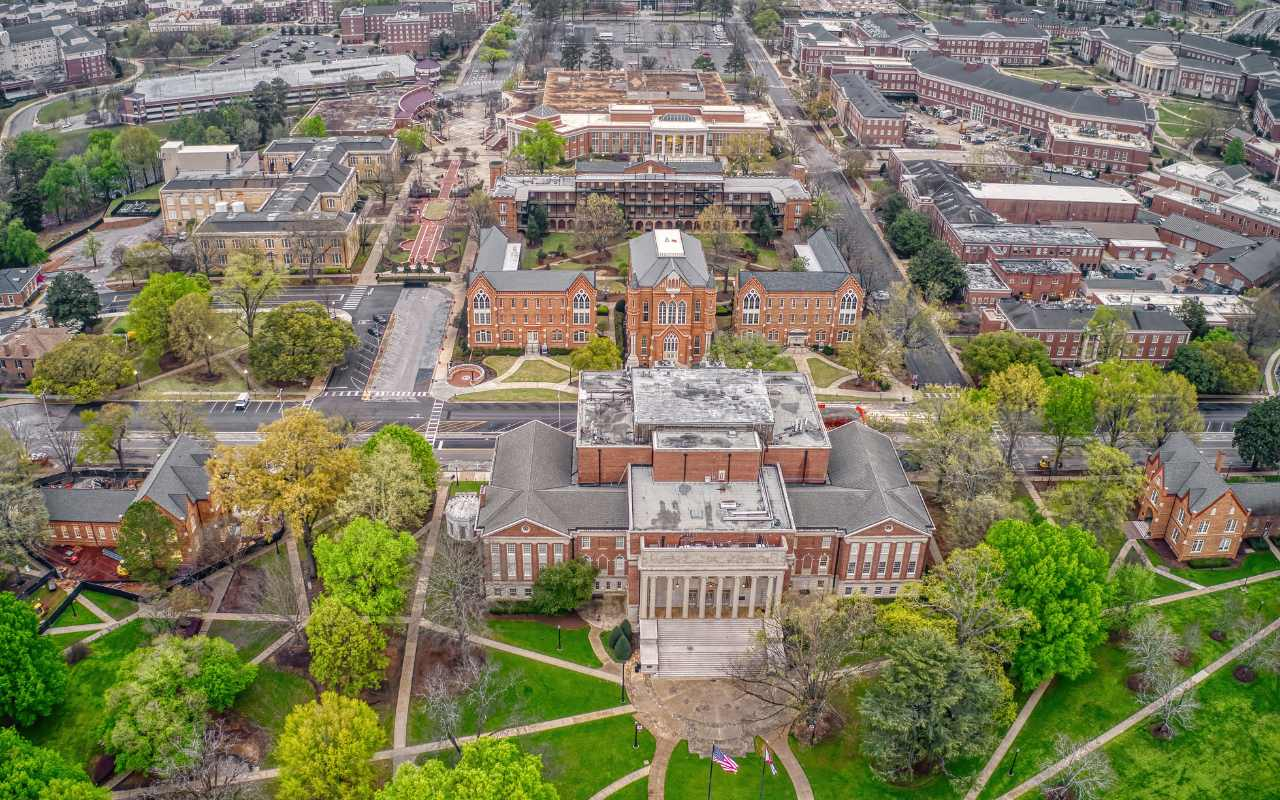
3. Columbia University
Located in New York City, one of the most vibrant and dynamic cities in the world, Columbia University stands as a bastion of intellectual stimulation and cultural diversity. This small liberal arts school has a strong commitment to global citizenship and has led to generation after generation of empowered and proactive students seeking to make positive change in the world. With many students seeking high-quality education in one of the world's nexus cities, Columbia University is one of the most competitive colleges.
- Class of 2028: 3.85%
- Class of 2027: 3.9%
- Class of 2026: 3.73%
"In the process of selection, the Committee on Admissions considers each applicant's academic potential, intellectual strength, and ability to think independently," Columbia's admissions website says. In addition to academic potential, Columbia also looks for students with maturity, curiosity, and passion in their applicant pool. They want to ensure that all admitted students will make "productive use" of their four years at the college.
- Average ACT Score: 34-35
- Average SAT Score: 1490-1580
- Average GPA: 3.9-4.0 (unweighted)
Columbia also has a world-renowned writing program. Interested in writing and looking for ways to fund higher education? Look no further than our writing scholarships!
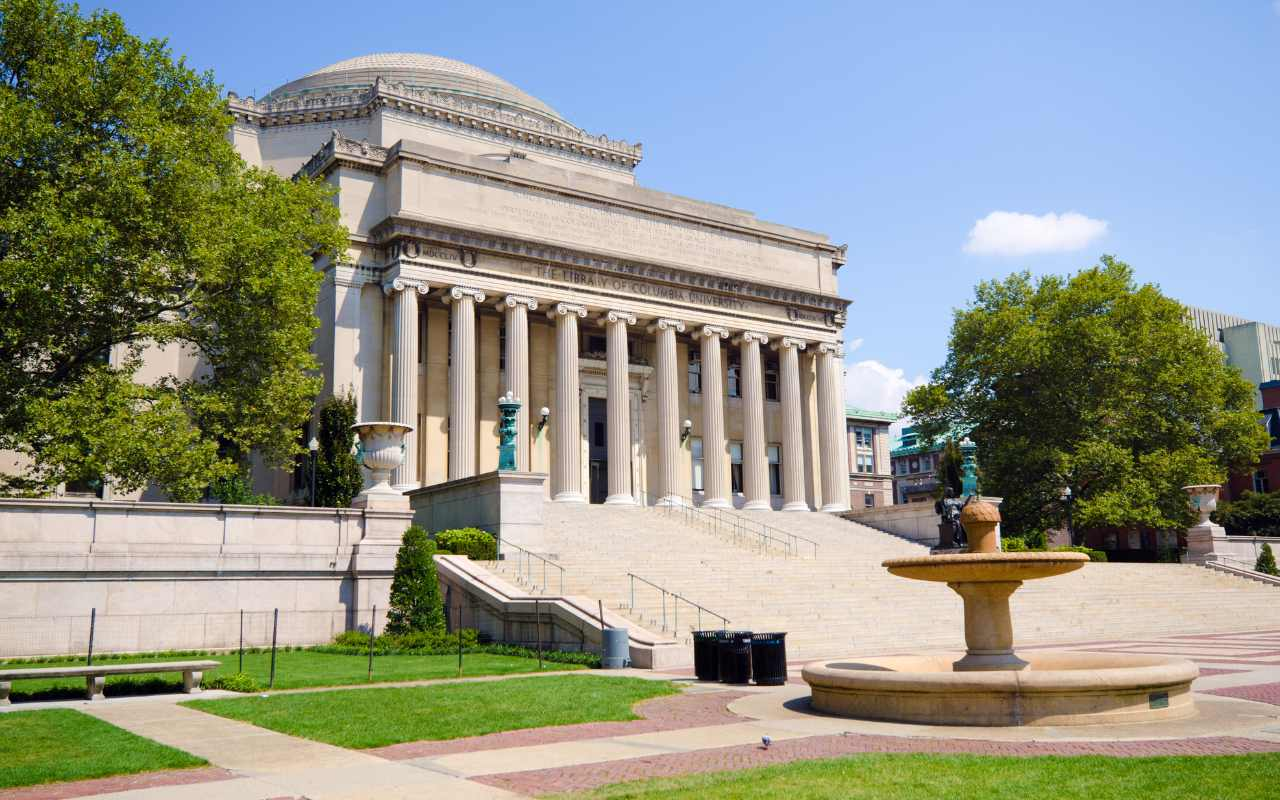
4. Stanford University
Stanford University, centered in the heart of Silicon Valley, is a world-renowned institution dedicated to academic excellence and diverse intellectual pursuits. From unprecedented innovations in STEM fields to a strong commitment to social responsibility, Stanford continues to shape the world's future leaders and innovators. For this reputation, it is also one of the hardest colleges to get into in the world.
- Class of 2028: n/a (numbers not yet released)
- Class of 2027: 3.91%
- Class of 2026: 3.68%
Directly from their admission website: "At Stanford, we practice holistic admission." This means the admissions committee wants to evaluate who you are as a person, with academics, extracurriculars, and character being used to place your achievements in the context of your circumstances. That being said, Stanford does state academic excellence as its "primary criterion for admission."
- Average ACT Score: 33-35
- Average SAT Score: 1470-1570
- Average GPA: 3.9-4.0 (unweighted)

5. Massachusetts Institute of Technology
The Massachusetts Institute of Technology (MIT) has consistently topped global rankings for the best universities. As a global leader in scientific and technological innovation, MIT continues to push the limits of what a higher education institution can do for the world. Cutting-edge research, entrepreneurial spirit, and a transformative impact on society make MIT one of the best colleges in the world to attend.
- Class of 2028: 3.92%
- Class of 2027: 3.83%
- Class of 2026: 3.37%
"Our process is a student-centered process," MIT says on its website. A strong academic transcript just means that you're competitive with other qualified applicants. To really differentiate yourself, your passions, your unique hobbies, and your personality need to take center stage. MIT wants to see that you've embraced life to the fullest and are prepared to take it to the next level in college.
- Average ACT Score: 35-36
- Average SAT Score: 1530-1580
- Average GPA: 3.9-4.0 (unweighted)
Interested in attending MIT and have a strong background in STEM subjects like computer science, math, or engineering. Check out these scholarships tailored specifically towards STEM students!
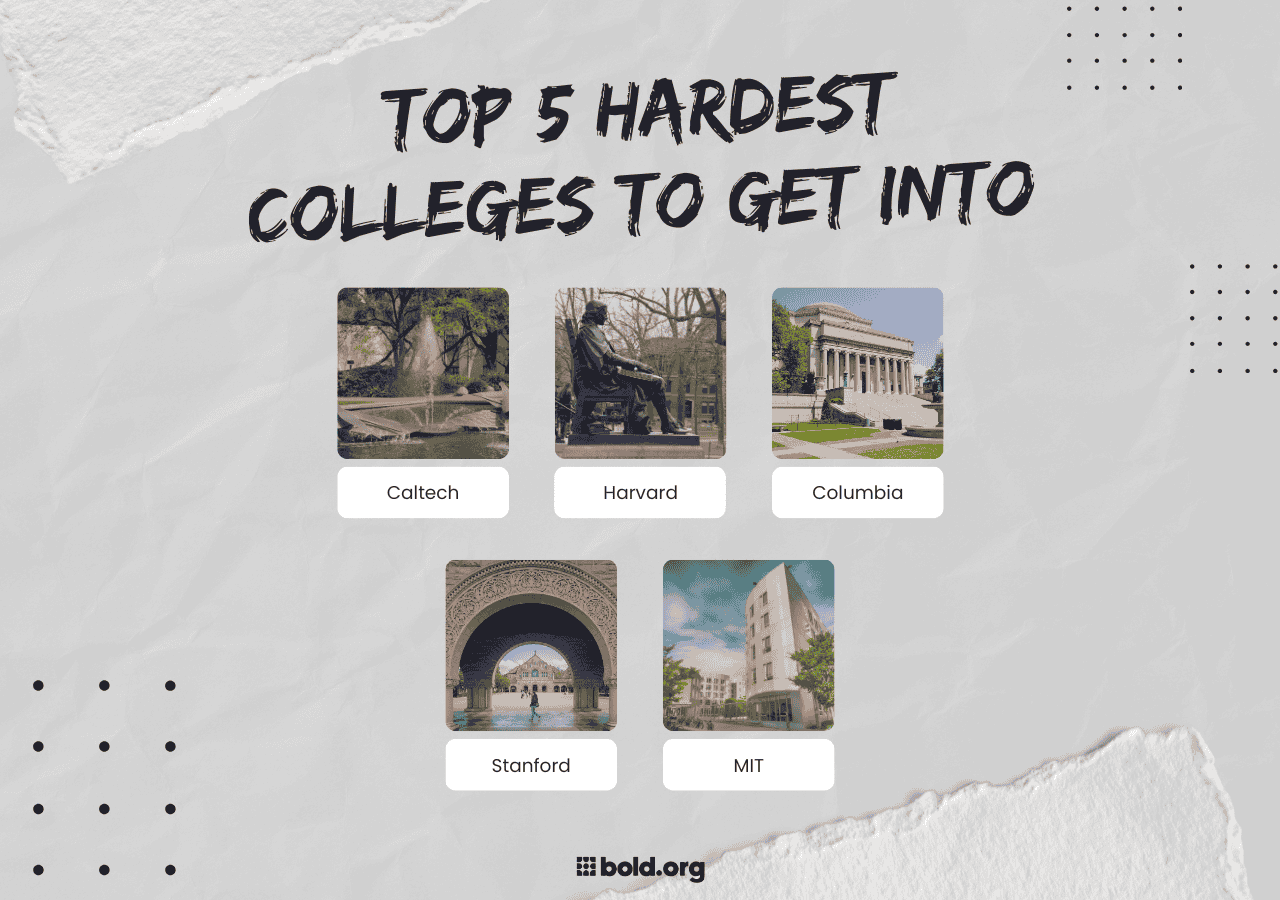
Other Colleges With Low Acceptance Rates
- Yale University - 4.5%
- Princeton University - 4.5%
- Vanderbilt University - 5.1%
- Duke University - 5.1%
- Dartmouth College - 5.3%
- Brown University - 5.4%
- Johns Hopkins University - 6.2%
Some honorable mentions for the hardest colleges to get into include the United States Military Academy at West Point (10%), Tulane University (13%), and Georgia Institute of Technology (14%).
Create Your Free Profile to Apply for Scholarships Today!Admissions Process
Now that you've seen all the low acceptance rates, you may be feeling a little disheartened, but do not fret. While there is no clear way to guarantee your admission into one of the hardest colleges to get into, there are many things you can do to make your application stand out.
Let's look at the different parts of an application and how you can make each one shine!
Leverage a strong academic background to secure extra funds for college with our guide on how to apply for academic scholarships!

Academic Record
Universities prioritize your academic record, typically reflected in your high school GPA and transcript. For highly selective colleges, a GPA of 3.9+ and a strong AP course load are recommended. Admissions officers, especially those at a liberal arts college, seek students who go beyond basic requirements, so challenging yourself with AP or college courses can make your application stand out.
Extracurriculars
Academics aren't everything; many colleges, especially liberal arts schools, seek well-rounded candidates who contribute beyond the classroom. They value involvement in athletics, community service, and clubs, with an emphasis on leadership and initiative. Demonstrating proactive efforts to improve your community can make you a more holistic and appealing candidate.
Personal Essay
The personal essay is a key part of the college application, often required by Ivy League schools through the Common App, along with additional supplemental essays. Unlike your GPA and extracurriculars, which are just data points, the essay lets you showcase your personality, character, and authenticity. It’s your chance to stand out from other applicants with similar stats and involvement.
Check out our guide for how to craft a compelling personal statement to increase your chances of getting into a selective university!
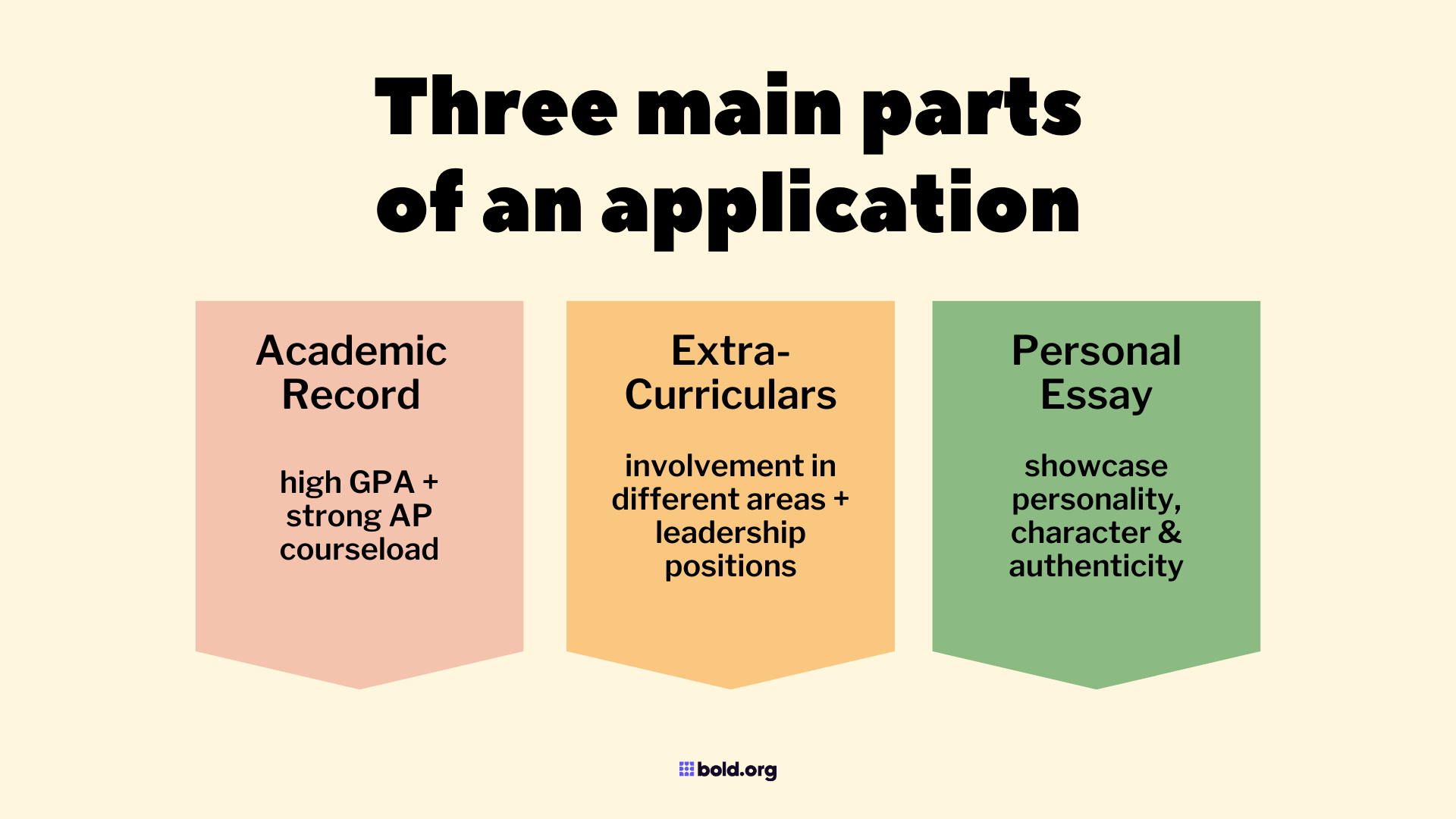
Frequently Asked Questions About the Hardest College to Get Into
What are the hardest colleges to get into in the world?
The California Institute of Technology still comes out on top with an acceptance rate of 3.14% for the Class of 2027. The closest international competitors are the University of Oxford (UK), with an acceptance rate of 14%, and the National University of Singapore (Singapore), which has an acceptance rate of around 7-10%.
What is the best university in the world?
The Times Higher Education ranks the University of Oxford as the top university, followed by Stanford and MIT, while QS World Universities ranks MIT first, with Oxford and Cambridge next. Rankings vary based on different evaluation metrics, so there's no consistent #1. The best university for you depends on how well it fits your interests and supports your desired program, with factors like acceptance rate being just one minor consideration.
Are SAT and ACT scores important?
It's not as important as your personal essay, grades, and extracurriculars. Many colleges are now test-optional, meaning students can choose whether to submit their scores. Test scores can enhance your application by showcasing academic ability, especially if your school lacks rigor, but they won’t make or break your application.
If you're still worried about how big an impact SAT and ACT scores can have on your application, read through our SAT and ACT guide to feel more confident on your test day!

About Ellie
Ellie is an exceptional writer and researcher with expertise in financial aid, scholarship applications, and aid negotiation. Throughout high school, she applied for scholarships and was able to win enough to cover all of her external scholarship limit.
Ellie is a freshman at Brown University, majoring in Classics and Literary Arts with a focus on fiction. She’s currently a research assistant for the American Sign Language department at Brown University where she fulfills many different roles to promote ASL's presence on campus and in the local community.
Experience
Despite being a recent high school graduate, Ellie has already built a strong foundation as a writer. She volunteered with an online nonprofit to launch their pilot blog program, excelling as both a writer and editor. Her role as the editor-in-chief of her high school newspaper further honed her editorial skills, while her participation in international Debate & Forensics competitions enhanced her ability to craft compelling arguments and narratives. These experiences showcase her initiative, leadership, and dedication to the craft of writing.
Since joining the Bold.org team in 2024, Ellie has leveraged her extensive background as a scholarship applicant and recipient to help others navigate the scholarship application process. Her expertise also includes crafting resumes, writing cover letters, and preparing for interviews.
As a student who will invariably graduate with debt, she is increasingly sensitive to the financial pressures college students face. Motivated by her desire to make a meaningful impact, she aims to advocate for accessible financial resources and support systems that can help alleviate the burden of higher education costs for future students.
Ellie is driven by her passion to make a meaningful impact. Through her creative and engaging writing, she addresses relevant issues with the powerful art of storytelling. Ellie strives to make information accessible, helping students understand the nuances of college life.
Quote from Ellie
"There is a defiance in being a dreamer."